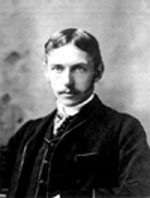The Earth Speaks to Bryan (1925), p. 5; written in response to the Scopes Trial, where Bryan spoke against the theory of evolution. They had previously been engaged in the controversy about the theory for several years. The title refers to a Biblical verse from the Book of Job (12:8), “Speak to the earth and it shall teach thee.”
Context: The Earth Speaks, clearly, distinctly, and, in many of the realms of Nature, loudly, to William Jennings Bryan, but he fails to hear a single sound. The earth speaks from the remotest periods in its wonderful life history in the Archaeozoic Age, when it reveals only a few tissues of its primitive plants. Fifty million years ago it begins to speak as “the waters bring forth abundantly the moving creatures that hath life.” In successive eons of time the various kinds of animals leave their remains in the rocks which compose the deeper layers of the earth, and when the rocks are laid bare by wind, frost, and storm we find wondrous lines of ascent invariably following the principles of creative evolution, whereby the simpler and more lowly forms always precede the higher and more specialized forms.
The earth speaks not of a succession of distinct creations but of a continuous ascent, in which, as the millions of years roll by, increasing perfection of structure and beauty of form are found; out of the water-breathing fish arises the air-breathing amphibian; out of the land-living amphibian arises the land-living, air-breathing reptile, these two kinds of creeping things resembling each other closely. The earth speaks loudly and clearly of the ascent of the bird from one kind of reptile and of the mammal from another kind of reptile.
This is not perhaps the way Bryan would have made the animals, but this is the way God made them!
Famous Henry Fairfield Osborn Quotes
As quoted in the closing address by Dr. Henry Sloane Coffin, president of the Union Theological Seminary, New York, at the Memorial Service for Osborn at St. Bartholomew's Church, N.Y. (18 December 1935); published in "Henry Fairfield Osborn", Supplement to Natural History, Vol. 37, no. 2 (February 1936), p. 133 <!-- Bound in Kofoid Collection of Pamphlets on Biography, University of California -->
Context: Every breath you draw, every accelerated beat of your heart in the emotional periods of your oratory depend upon highly elaborated physical and chemical reactions and mechanisms which nature has been building up through a million centuries. If one of these mechanisms, which you owe entirely to your animal ancestry, were to be stopped for a single instant, you would fall lifeless on the stage. Not only this, but some of your highest ideals of human fellowship and comradeship were not created in a moment, but represent the work of ages.
"Evolution and Religion", The New York Times (5 March 1922), p. 91; written in response to an article a few days earlier in which William Jennings Bryan challenged the theory of evolution as lacking proof.
Context: Direct observation of the testimony of the earth... is a matter of the laboratory, of the field naturalist, of indefatigable digging among the ancient archives of the earth's history. If Mr. Bryan, with an open heart and mind, would drop all his books and all the disputations among the doctors and study first hand the simple archives of Nature, all his doubts would disappear; he would not lose his religion; he would become an evolutionist.
The Earth Speaks to Bryan (1925), p. 8
“We have to be reminded over and over again that Nature is full of paradoxes.”
As quoted in The Evolution Deceit : The Scientific Collapse of Darwinism (2001) by Hârun Yahya, p. 84
Evolution and Religion in Education (1926), p. 41
As quoted in "The World's Work: A History of Our Time" (1924) by Walter Hines Page and Arthur Wilson Page, p. 253; also in "Man Rises to Parnassus" (1928), p. 220
Evolution and Religion in Education : Polemics of the Fundamentalist (1926), p. 138
